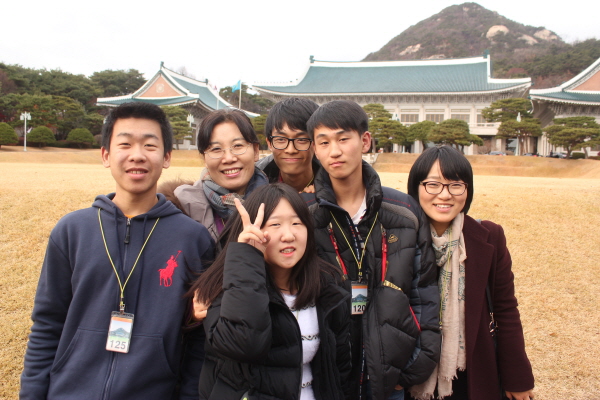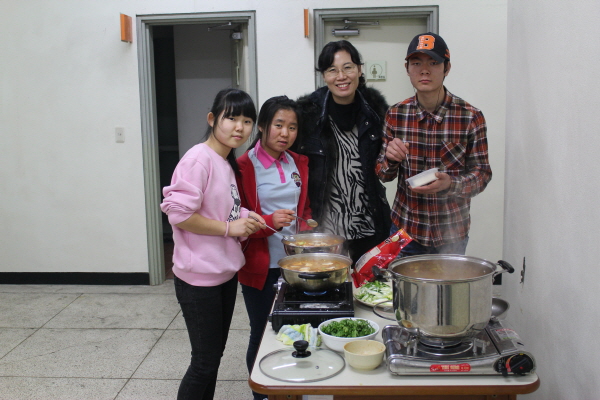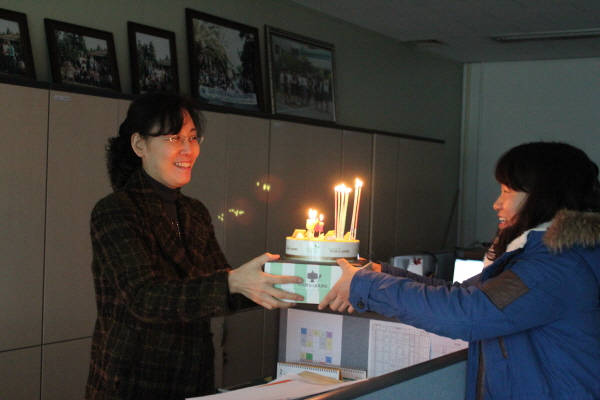
In 2014, vice-principal of Dream School received a presidential citation in the field of education. She has devoted herself to the refugee students from North Korea for several years. Spending time with the North Korean students, she has learnt the true meaning of purity. The Sookmyung Times met Lee Youngju to learn about her work with Dream School and North Korean students.
Dream School is an alternative school for North Korean refugee students, located in Cheonan. What motivated you to start helping these students and work as vice-principal of Dream School?
I have always been interested in working with North Korean refugee children. However, it wasn’t until early 2000 that I had an opportunity to meet a teenager from North Korea. I met the student at our church gatherings. The more time I spent with the student, the more I learnt of their hardships. Then, in the summer of 2002, I went to Thailand for a fatigue duty as a member of the Unification Organization. There I met a number of North Korean teenagers and we spent the summer together in Bible school. I did a variety of activities with them and made beautiful memories that I can’t forget until now. Even after I came back from Thailand, I was still moved by their purity and kindness, so I became determined to help refugee students from North Korea.
In 2002, you visited Thailand for missionary work overseas. Reflecting on that time, what did you learn and feel as you met 40 refugee students during the missionary work?
Spending time with North Korean refugee students, all missionaries, including myself, actively participated in various activities. We engaged in a lot of programs such as sports events, track and field events, and Bible studies. We also cooked together and had a great time even though there was not enough time to become extremely close. I was quite surprised at and felt proud of the North Korean students’ purity and kindness. Even though some of the missionaries’ activities were quite simple and somewhat childish, the students did their best and enjoyed each moment. I felt empathetic and wanted to keep in touch with them forever. That was the moment I realized that those are the ones who need a genuine help in the long-run.

What made you to work in the field of social welfare and education even though you majored in chemistry at Sookmyung Women’s University?
Throughout my years at Sookmyung, I was interested in education, so I completed an education degree as well. I dreamt of becoming a teacher after graduating from university, but my dream didn’t come true and I went to work as an office worker at a typical Korean company. After retiring from the company, I was offered the chance to work in the education field as a teacher for alienated children in a small teaching organization. Teaching these children, I attained a certificate deeming me a specialist in the area of youth tutelage. I studied more and focused on my learning towards social welfare. I spent a lot of time with alienated children in a group home, which is a living style similar to the shared-house system. I felt the system was perfectly suited to the children. Dream School is just one of the innovations I dreamt of establishing for young alienated students.

Having spent so much time with North Korean refugee students in Dream School, what can you say about the major differences between your school and normal schools?
Chiefly, the atmosphere differs. Most North Korean refugee students have never had the opportunity to be reared by a “regular” family. They have typically grown up in single-parent families or boarded at relatives homes. Because of their past living conditions, they are usually filled with distrust and lack affection. During their escape, they also faced extreme danger, which filled them with high levels of insecurity and fear. These kinds of background environment have made them to fill insecure in their everyday lives. At Dream School, all teachers make the education and living environment comfortable throughout the students stay. Because students and teachers live together, students learn and express their feelings with the help of teachers and educational leaders. In other words, Dream School is both school and home for them.
To enter university in Korea, students must take a school qualification equivalency examination if they opt out of normal schooling. However, North Korean refugee students are not candidates for this option. How do you feel about this?
North Korean refugee students tend to enter university through diverse special admission courses. While South Korean students can enter university via the Korean Scholastic Aptitude Test(KSAT), North Korean students must get a permission to be qualified as an university student. Even though the manner of entering university differs, it is wrong to say that people who don’t take the KSAT should not learn and develop. They might even be more successful than others, but most North Korean refugee students fail to get qualified since they are considered unlikely to succeed. However, having worked with the students at Dream School, I can attest to the fact that North Korea students are quite skillful and have the potential to succeed at university. I think they deserve the chance to learn and experience a greater world by entering university just like other Korean students.
What are your future plans and hopes as vice-principal and mother of Dream School?
Dream School was founded 13 years ago. Throughout its 13 years, about 300 North Korean students have come through its door and have gone on to become bright citizens, functioning well in society. I feel really proud of myself whenever I see Dream School alumni out in society. Still, I dream of striving for a Dream School environment that constantly cares for the comfort of North Korean refugee students. By continuing my pledge and trying to always see the world via their eyes, I will work to establish more programs that enable better communicate between the students and the society. I hope that in the future they do not see themselves as different from other Korean students living in South Korea. In other words, I will endeavour to establish ‘unity’ among people from all backgrounds.
Would you please offer some advice for Sookmyung students?
Sookmyung Women’s University offers plenty of programs that can guide you towards the career of your dreams. If you are willing to work for your dream, nothing will block you. Also, as you consider your future, it is important to ponder deeply the career path that will lead to personal rewards in the long run. I hope all Sookmyung Women’s University students walk proudly and never give up trying to achieve their dreams in life. No matter what environment you are in right now, never put your dream aside. Each of your dreams are precious enough to be nurtured.

Lee Yongju
•MB in Department of Chemistry '85
•Vice-principal of Dream School since 2011
•Awarded the Minister of Unification Certificate in 2012
•Received Commendation from the President in 2014


